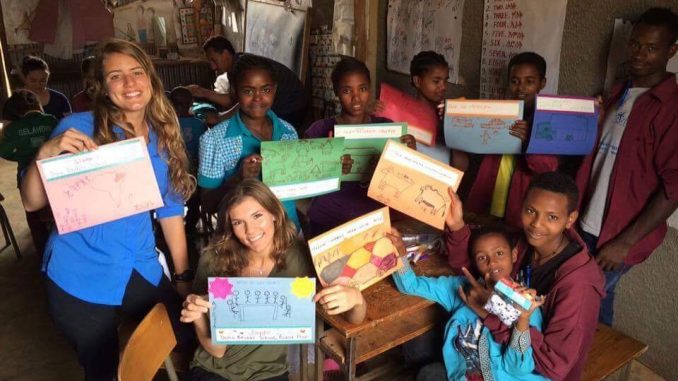
The influence of the SUNY New Paltz communications disorders department is so widespread that even deaf students in eastern Africa can attest to it.
This past summer, nine students from SUNY New Paltz had the chance to work hands-on with the deaf community in three Ethiopian cities.
Communications disorders lecturer Rebecca Swenson helped create this study abroad trip with Visions Global Empowerment (Visions) after a SUNY New Paltz alum came back from a previous trip to the country and raved about the program.
Visions is an organization that recognizes the need for educators to help the deaf communities in countries such as Ethiopia, Sri Lanka and India. According to their website, their mission is “to change patterns of inequality by supporting educational initiatives for youth affected by poverty, conflict, and disability.”
The research trip centered around analyzing the deaf community as well as Ethiopian culture. They visited Addis Ababa, the capital of Ethiopia, worked in Bahir Dar at the Bahir Dar University, and visited Lalibela, a town in northern Ethiopia.
Maria Gillin, a SUNY New Paltz alum and a graduate student at Hunter College, kept in touch with Visions after her initial trip in 2015 and was able to stay an extra two weeks, assisting on work in Addis Ababa with the Ethiopian Women with Disabilities National Association (EWDNA), an organization that provides training and support to help women become independent.
“Most disabled women in Ethiopia are discriminated against and not given any sort of representation, so EWDNA holds bi-weekly coffee programs to give them a forum to discuss their problems openly,” Gillin said. “Then, when possible, EWDNA uses the topics of those discussions to start new projects that support the women.”
While Gillin was there, she was working on deaf empowerment efforts through their livelihood program with Visions. She interviewed deaf women about their lives and how they would benefit through the program.
Gillin said her favorite part was being immersed in their culture and living like an Ethiopian person when she wasn’t with the rest of the students. She learned the native language, how to communicate with the locals in Amharic and take public transportation and sampled local cuisine.
“Being there with EWDNA was really eye-opening because it made me realize how many systems we have in place in America to help people with disabilities that don’t exist there,” Gillin said.
Jayde Ragimierski, a fourth-year communication disorders major with a minor in deaf studies, felt she gained the most experience while working with the deaf community in Bahir Dar.
While at the university, students worked with deaf children of all ages, often being paired up and asked to create a lesson plan. Ragimerski and her partner Juliette Lefebvre, a third-year communications disorders major, crafted a lesson plan where they had the students write their names in English and Amharic and then draw something they loved.
“It was interesting to see what the children drew in comparison to what we would expect children in America to draw,” Ragimerski said. “Their pictures revolved around their family and animals.”
Ragimierski is a member of Pi Phi Delta sorority and has planned fundraising events to keep her connected to the deaf community and the children she bonded with in Ethiopia.
She hopes to help diversify the sources of funding for the Kal Center for Special Needs, a nonprofit organization based in Bahir Dar “committed to promoting the development and overall welfare of the differently-abled in Ethiopia.”
“My time spent abroad allowed me to form unforgettable friendships, learn and appreciate Ethiopian culture, as well as have the opportunity to grow as an individual,” Ragimierski said.
